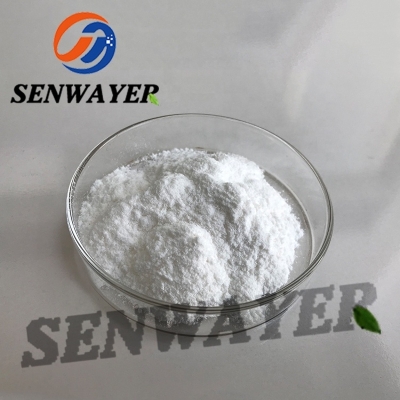2020 CTIC Medical Investment Summit concluded successfully (including the list of the most active institutions docking with the summit)
-
Last Update: 2020-01-22
-
Source: Internet
-
Author: User
Search more information of high quality chemicals, good prices and reliable suppliers, visit
www.echemi.com
The 4th CTIC Medical Investment Summit was successfully concluded I would like to thank Professor Jennifer doudna of the University of California, Berkeley, Professor Atul Butte of the University of California, San Francisco, Professor Mark Davis of Stanford University, Professor Jeff Karp of bregen and women's Hospital of Harvard Medical School, and more than 30 leading investors and industry figures for their speeches More than 400 executives and investors from 150 US medical companies and 200 Asian investment institutions attended the summit On the day of the summit, 350 one-on-one meetings (44 meetings per hour on average) were held, generating more than 1400 information about investor entrepreneur appointments At the same time, I also congratulate the 14 roadshow companies selected this time have attracted the attention of a large number of investors, hoping that they can successfully complete the financing and cooperation plan in 2020 We will release the list of the most active investment institutions and companies in this summit Please see the end of the article Thank Zhihui converge minds, Fosun Group, IDG capital, Wilson Sonsini, Boyuan capital, Jifeng capital, Qiming venture capital, Chende capital, Huamei bank and Yuhang capital for their support for this summit At the same time, we also thank biocentry, CLSA, CLSI, MedTech strategies and other institutions for their strong support Ms Lin Yanhong, managing partner of CTIC capital, delivered an opening speech titled "genome editing with CRISPR - CAS systems: challenges and opportunities" by Professor Jennifer doudna of the University of California, Berkeley Professor doudna said in his speech that human beings need to keep an open attitude towards scientific research and constantly explore the world around us At first, CRISPR project was established to understand how the adaptive immune system in bacteria can protect the host's biochemical project However, due to the strong curiosity of scientists, CRISPR technology eventually turned into a major technological breakthrough CRISPR technology has a profound impact on scientific research, public health, agriculture, biomedicine and other aspects Scientific research: biologists use CRISPR technology to find out the real reason for the left-handed thread of snails; public health: now scientists have the ability to conduct gene editing of mosquitoes to prevent the spread of dengue fever and SecA virus; Agriculture: for example, CRISPR In biomedical aspect, CRISPR technology can be used to detect specific gene sequences, so as to achieve early diagnosis and screening of diseases At present, Professor doudna and Professor Zhang Feng's laboratories are studying this direction Professor George church's team at Harvard University created organs suitable for human transplantation by editing pig genes At the meeting, Professor doudna showed us a video from the unpublished documentary "human nature" The video tells the story of Stanford University scientists who have successfully cured a boy named David of sickle cell anemia by using single gene editing technology The documentary records David's suffering in the hospital and his ability to recover after treatment This makes the public really aware of the powerful and huge potential of CRISPR technology Professor doudna thinks that the important question now is how to use this powerful tool Professor doudna is very concerned about the ethical issues arising from the rise of gene editing technology She believes that the current gene editing technology can only work on somatic cells, and the scientific community has unanimously agreed not to allow gene editing of the human body until there are clear operational guidelines in the future The World Health Organization (who) and the National Institutes of Health (NIH) of the United States will report the latest progress in the development of rules for gene editing and operation of germline cells in the near future Professor Atul Butte of the University of California, San Francisco, delivered a keynote speech titled "carefully practicing medicine using ten trillion points of data." Professor Butte introduced the powerful role of current gene data and clinical data from three aspects: genome data can better diagnose diseases: Professor Butte took preeclampsia as an example, and the main diagnostic method at present is urinalysis to check the relevant protein indexes in urine But the actual accurate effect is far from enough A company called carmenta can accurately determine the risk of preeclampsia through the level of blood gene expression It took only 24 months for the company to be acquired by Progenity; data analysis was used to identify old drugs for new purposes to help reduce the cost of drug development: a computing drug development company named Numedii found that Niclosamide and Sorafenib showed significant effect on the animal model of HCC through its platform; Clinical data stored in electronic health records will change the way doctors treat: the University of California medical system is creating a new medical collaboration system, sharing treatment information and patient results from more than 10 academic hospitals This has enabled all doctors in the University of California's medical system to access medical information for more than 15 million patients (5% of all patients in the United States) This new collaboration system has greatly reduced the cost of medical treatment and medication, and significantly improved the treatment effect At the same time, Professor Butte's team is using the medical data to draw "California disease and death information map" Through this map information, doctors will be able to accurately predict the risk of disease and death of California residents, so as to carry out various prevention methods "Data is the new soil You plant out seeds and data helps them to grow." -- Professor Atul Butte delivered a keynote speech titled "immunology and the future of medicine" at the 2020 CTIC Medical Investment Summit, Stanford University, Professor Mark Davis Professor Davis first raised a question: scientists have been studying the immune system for a hundred years But why is the current diagnosis of the immune system still based on leukocyte count (1915) and Hemogram (1959) as the gold standard? As if modern immunology, which has won 15 Nobel prizes, has never appeared Professor Davis explained that the current research on the immune system mainly uses inbred mice, from which scientists can generate a large number of information about cells, molecules and immune mechanism Although the cells and molecules in mice are very similar to human beings, they are not exactly the same, and the disease mouse model is not a reliable basis for human research So it is necessary to study the immunity and disease of human body directly But how? Because most of the methods used in mice cannot be used in humans In order to overcome this challenge, the team of Professor Mark Davis at Stanford University developed a new tool and analytical model, which can use human blood as the tissue and collaborative model of human immunotherapy modeling Professor Davis introduced his article published in nature in 2020 on the first use of a CD8 memory T cell in a patient's blood to come up with a link between Alzheimer's and Parkinson's disease Topic discussion 1: the future trend of biomedical investment and cooperation was chaired by Dr Andrew Lee, founder of startx Med, Dr Liu Cheng, CEO of Eureka therapeutics, Dr Nils lonberg, risk partner of Canaan partners, Dr Lu Hongbo, managing partner of Lilly Asia Fund, and Dr Stella Xu, managing director of Quan capital, participated in the discussion Dr Nils lonberg pointed out that today's big pharmaceutical companies are turning to specialty drugs and drugs for rare diseases, thus reducing the number of drug salesmen Dr Stella Xu pointed out that "the development of old drugs and new usage" is the current focus of pharmaceutical development, and there are great market opportunities for new targets and new areas of disease treatment Dr Liu Cheng mentioned at the meeting that cell therapy is booming, and its development trend has caught up with the antibody drug development in the 1990s; at present, the bottleneck of cell therapy lies in the production process Dr Lu Hongbo added that at present, China's biomedical market is facing unprecedented opportunities More efficient drug approval systems and processes, the birth of many R & D drug development companies, diversified financing and exit channels, and the eager pursuit of new breakthrough direction by domestic traditional Chinese medicine based old pharmaceutical companies are the main factors driving this change On the most popular topic of immunotherapy, the guests also expressed their views Dr Nils lonberg believes that in the next five years, immunotherapy development companies should make more reasonable use of animal models and measure the immunotherapy data brought by animal models in a more accurate way Dr Stella Xu believes that the combination of some traditional therapies and new immunotherapies will become a new direction in the future Liu believes that the main treatment direction of immunotherapy in the future will be autoimmune diseases and infectious diseases Topic 2: opportunities and challenges in the era of cross-border cooperation Ms Lin Yanhong, managing partner of CTIC capital, presided over the topic discussion Ms Liang yingyu, managing partner of Qiming venture capital, Mr Kevin Xie, chairman of Fosun health group and chief representative of Fosun America, Mr wall Dong, partner of 6 dimensions capital, and Mr Andrew ng, VMS investment group participated in the discussion Ms Liang yingyu, managing partner of Qiming venture capital, said that at present, there are obvious signs of slowing down in China's relevant medical investment market The total amount of cross-border investment between China and the United States has declined by 90%, and the total amount of domestic medical investment in China has also declined by 70% Ms Liang yingyu believes that this phenomenon is a benign adjustment of the market and is conducive to the long-term development in the future Mr Walton believes that China's foreign exchange control has limited policy restrictions on ODI and trump government's restrictions on technology transfer, leading to a marked slowdown in cross-border investment and cooperation in 2019 In particular, the participation of Chinese funds in the B and C rounds of American companies has dropped significantly But in the medium term, cross-border investment and cooperation are very optimistic At present, the newly established Chinese biopharmaceutical companies have become more and more integrated with the world, and the trend of Sino US cooperation will be difficult to be blocked Mr wall Dong believes that the clinical research of multi centers and the promotion of commercialization of the two countries and above will be opportunities for the future At the same time, the competition will become more and more fierce, which requires the enterprises to speed up the response speed, speed up the iteration of products, and allow less and less opportunities for trial and error Andrew ng, a VMS investment group, also said the current trend of cross-border investment is slowing down He believes that the focus of the current mode of cross-border cooperation between China and the United States should be to spend more time communicating with each other and build mutual trust before cooperation Mr Kevin Xie thinks that at present, the valuation of China's medical market is on the high side, while the U.S market is more rational He is optimistic about the prospect of cross-border investment But Mr Kevin Xie also said that the current situation of cfuis and ODI would slow down cross-border investment Topic 3: development of combination of in vitro diagnostic technology and artificial intelligence technology Mr Feng Han, partner of pagoda capital partners, biopath
This article is an English version of an article which is originally in the Chinese language on echemi.com and is provided for information purposes only.
This website makes no representation or warranty of any kind, either expressed or implied, as to the accuracy, completeness ownership or reliability of
the article or any translations thereof. If you have any concerns or complaints relating to the article, please send an email, providing a detailed
description of the concern or complaint, to
service@echemi.com. A staff member will contact you within 5 working days. Once verified, infringing content
will be removed immediately.







